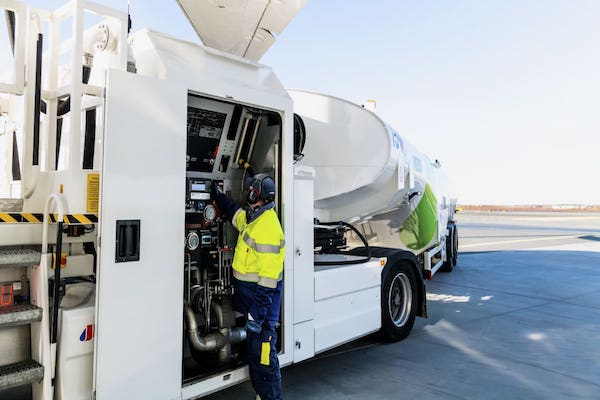A coalition of major UK airports is spearheading a campaign for increased production of sustainable aviation fuel (SAF).
The initiative seeks government support to commence production within the next year, highlighting both economic and environmental benefits.
The UK’s busiest airports have launched a campaign advocating for increased sustainable aviation fuel (SAF) production. This initiative, named ‘Back British SAF’, is a collective effort supporting the start of production by the following year.
Heathrow, Gatwick, Manchester, and Stansted airports lead this movement, urging the government to expedite the Sustainable Aviation Fuel (Revenue Support Mechanism) Bill. Their push emphasises the economic and environmental benefits of domestic SAF production, aiming for five plants to begin construction soon.
Sustainable aviation fuel is crucial for the aviation sector’s environmental strategy. Industry voices have warned that demand for SAF is set to outpace supply unless immediate action is taken by stakeholders.
A Rise coalition spokesperson highlighted the global push, stating, “The production of SAF is one of the fastest growing industries on the planet.” He emphasised that the UK must act swiftly to remain competitive against other regions such as the US and the EU.
Creating a self-sufficient SAF industry in the UK promises significant economic benefits. According to the coalition, this could inject £1.8 billion into the economy by 2030.
Furthermore, it could create 60,000 jobs by 2050, enhancing energy security and promoting sustainable growth. These economic prospects underpin the urgent call for legislative support from the government.
Gatwick CEO Stewart Wingate expressed concerns over limited SAF availability, which hinders the industry’s advancement towards increased SAF reliance. Despite Gatwick’s SAF-ready infrastructure, current supply constraints limit potential development.
His sentiments echoed the wider industry concern that without government incentives and support, the growth of SAF production will remain stagnant.
Ken O’Toole, CEO of Manchester Airports Group, highlighted governmental facilitation as pivotal. He stressed that early legislation could offer investor confidence, essential for nurturing a thriving SAF sector.
According to O’Toole, “The UK has the opportunity to create a world leading SAF industry.” He called for the government to introduce necessary revenue support mechanisms to ensure rapid industry growth.
The collaboration of airports and leaders demonstrates a unified front in pushing for government partnership. Their collective voice aims to secure a future where SAF is integral to the UK’s aviation landscape.
The timely introduction of the SAF Revenue Support Mechanism Bill could lead to influential industry outcomes. Industry leaders argue for its importance in solidifying the UK’s position in global aviation innovation.
Conceivably, a robust SAF industry could help the UK achieve its net-zero targets, fostering economic resilience while ensuring energy security.
The stakeholders see this as a defining moment in aviation, urging legislative action to prevent losing competitive advantage globally.
The aviation industry’s united call to action underscores the urgency of SAF legislation for a sustainable future.
Timely legislative intervention could establish the UK as a leader in sustainable aviation, driving both economic growth and environmental responsibility.

